First Aid Kit
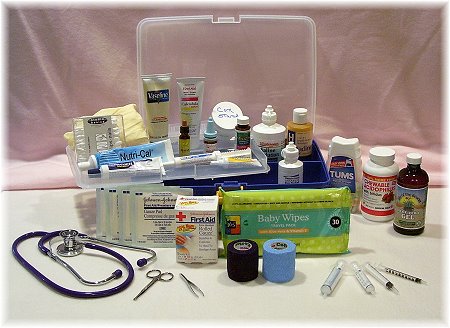
We highly recommend that you have some form of a first aid kit for your chinchilla. Even if you live with only one chin it will be worth having medical supplies on hand. You can go to your local craft store to pick up a container to keep most of the items in. Plastic sewing boxes or craft supply cases are great because they come in a variety of sizes. Most have a tray with divided sections, and the tray lifts out to reveal more storage space underneath.
Below is a list of the items that we suggest you have available. Do not hesitate to take your chinchilla to a veterinarian if you suspect your chin is sick. This first aid kit is just that, an aid until proper veterinary care can be obtained. Many of the items listed are things your veterinarian may suggest for you to use as supportive care in addition to any treatment he/she may prescribe for your chin. Always check dates on all medications to make sure they have not expired.
The five most important items you should have available at all time are: Pedialyte, Oxbow's Critical Care, Simethicone Infant Drops, Baby Food & Fresh Pineapple Juice or Papaya tablets.
Don't wait until there is an emergency before getting these items.
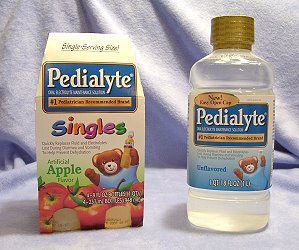
Pedialyte (or LiquiLytes): Excellent for dehydration and helps to replace electrolytes. We have found that apple or unflavored are most liked by chins. After opening, make sure you refrigerate any unused portion and use it within one week and then disgard. Give to your chin often by syringe in cases of constipation or severe dehydration. For mild dehydration mix with spring water 50/50 in your chins water bottle or by syringe. Make sure you replace the water bottle with fresh fluids every day. Check for expiration date on the Pedialyte bottle.
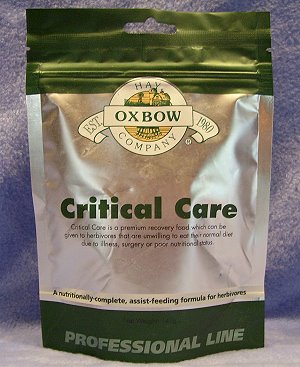
Oxbow Critical Care: This is a food replacement made by Oxbow Animal Health. It is available through Oxbow or your veterinary hospital and is used for hand feeding chins that refuse to eat on their own due to illness. This is a super product.
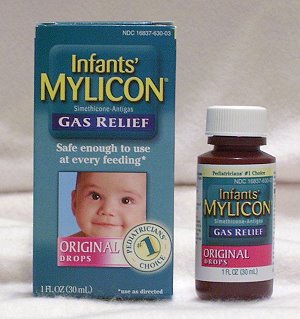
Simethicone Infant Drops: This is a must have if you live with a chinchilla. It is used for bloat/gas. It changes the consistency of the gas bubbles so they will break up more easily. It is very safe to use and there are no known drug interactions. You need to use the formula made for babies. There are two brands you will find which are Mylicon(shown) and Gerber.
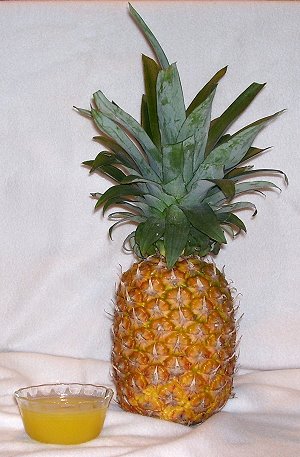
Fresh Pineapple Juice: Used to help break up most organic intestinal blockages. The natural enzymes in the fresh pineapple juice help to soften and break down food particles, which can bind together with hair and can form a hard mass. Do not use canned pineapple juice because the processing kills the enzymes that make the juice work so well. We get the juice from a nice golden ripe pineapple and then freeze it so we always have fresh juice on hand.
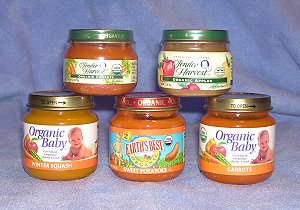
Organic baby food: The best choices are winter squash, sweet potatoes or carrots. This is used to mix with Critical Care or used on its own to stimulate appetite and provide nutrition to weak or sick chins. Do NOT give your chin any peas, green beans or corn.
These are additional items you can put into your first aid box.
Eye wash (not Saline solution): To flush any debris from the eye. Saline at times can be irritating to the eye.
Neosporin (NOT Neosporin Pain): For minor cuts and abrasions.
Vaseline or KY Jelly: For the removal of a hair ring.
Aloe Vera Gel (organic): An organic healer for minor cuts and abrasions.
Preparation H Ointment: In case of intestinal rectal prolapse, helps reduce swelling (consult your veterinarian before using).
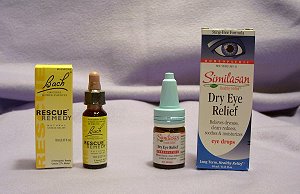
Bach Rescue Remedy Pet(flower essences): Use for emergency situations of stress or shock.
Similisan Eye Drops (dry eye formula): A homeopathic eye drop which is very good for irritated eyes.
Betadine: Dilute with spring water to use as a flush for abscesses and wounds. The dilution is 10% Betadine with 90% spring water.

Acidophilus Tablets (non-dairy): To balance the bacteria in the stomach when a chin is using antibiotics to prevent intestinal upset and possible diarrhea or constipation.
You can get these in Our Store on this web site. Should be kept in the refrigerator.
Cornstarch: A painless way to stop bleeding of minor cuts.
Saline Solution: To clean and flush wounds before medicating and bandaging.
Sterile Gauze pads: Regular gauze or non-stick to cover wounds.
Rolled gauze: For wrapping wounds after gauze pad is applied.
Vet Wrap: A self sticking elastoplast medical wrap to go over a gauze pad or rolled gauze if an injury is serious. It is very important that you do not wrap this material too tight. It is made of a stretchy material, and it is very easy to wrap a wound too tight which will cut off circulation to the area.
Q-Tips: You can use regular Q-tips, but we suggest cosmetic type because they tend to have less of the many loose tiny fibers which can easily get into wounds like regular Q-tips can.
Unscented baby wipes: For quick clean up when medicine or hand feeding get on a chin's fur or when their feet are dirty due to stepping on soft poops from diarrhea.
Tweezers (blunt end)
Scissors (medical type; blunt end)
Medical rubber gloves
Syringes (1, 3, 5 & 10 cc): For hand feeding, giving fluids, medicine and flushing wounds.
Calendula cream: A fantastic product which is a homeopathic cream to apply to minor cuts and wounds. Available in Our Store
Tums original (fruit flavor): Give as an added calcium boost to chins with white teeth.
These larger items should be stored in an area where they are readily available in case of an emergency.
Ice Pack/Marble tile: Keep a marble tile in the refrigerator until your chins need it. When placed in their cage, an overheated chin can lay on it to cool down. The marble tile will stay cool for an extended period. In an emergency, place ice in a metal pot and cover securely with a lid for overheated chins to lie next to. Use actual ice not gel ice packs which are toxic should your chin chew it.
Hand Towels & Fleece: Hand towels are a great size for handling chins when giving medication or hand feeding. A piece of fleece fabric is wonderful to keep on hand when comforting a sick chin or to place on the bottom of the carrier when transporting a sick chin to the hospital.
Stethoscope: Optional, but is nice to have on hand in times of illness.
Heating pad or hot water bottle: Wrapped in a towel or under the cage to keep an ill chin or kits warm.
Gram digital scale (optional): To keep track of your chins' weights, especially during times of illness or pregnancy.
